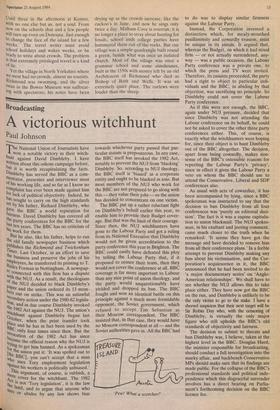Names and places
Peter Levi
In all the recent excitement about travel books the one that gave me greatest pleasure is a new one in Greek by Zesimos Lorenzatos, an elderly essayist and literary critic and a friend of Seferis, who writes with a special purity and cleanness unusual in any language. He has published some travel journals of expeditions by yacht among the Greek islands. I only wish I could translate them, but I am inclined to think they are untrdnslatable; perhaps their attraction is incommunicable in any other language. That may be as it should be: it is just another reason for learning Greek. They are better than the Cruise of the Nona, which is the nearest English analogy.
At the same time I have despaired of a travel piece, a stray chapter of an unwrit- ten book, that I was planning myself. Maybe that was because I have come to resent the style in which I planned it; it was full of details, but banal I suppose. It was about England, which is always difficult, because a discovery that comes fresh to the writer is not going to be fresh to those who live in the place and study it for years. One lacks authority, and one is too old in the end. The increasing sense that one cannot leave one's house without being robbed, poisoned, insulted, bitten by gnats and imprisoned in traffic jams is bad for the spirit of adventure. And one comes too late to places. The road across Stainmore from Scotch Corner to Brough is the purest pleasure, across the most thrilling land- scape in England. It is thickly seeded with antiquities, it passes two of Cotman's best pictures, which one recognises with a gasp, and the country of Bunting's Briggflatts lies all around it. But I wish I had known it before they improved the main road, when it was just the wandering relics of a Roman road.
Then again, one becomes more in- terested in people than in places. The human voice must be detached from the symphonies of nature and antiquities and places, and sound alone if it is to run true, as Lorca observed. It is an advantage to a travel writer abroad that he has to learn or exercise a language, it comes freshly to him, and through it the people he meets have the same freshness and strangeness. I do not know how to deal in print with dialect or regional intonation in English, freshly as they may echo in my ear.
What I did enjoy during the publishers' recent promotion of travel books was meeting the writers. I have never met a more sympathetic and diverse group of people. They were better company than most writers. They lacked the melancholy, the intensity and wistfulness, and the sometimes terrifying authority of poets. They were both modest and extremely spirited. They did not have the grave superiority of famous novelists. The only foible that they have in common, so far as I noticed, is that in the daytime they all seem to wear a version of the same shoes, which used to be called hush puppies: an unpre- tentious and highly practical choice. They had a humorous and determined air. But the eagle among the other birds, an older writer of deeper quality, as impressive as a great poet, was Wilfred Thesiger, and no doubt his new book will be better than all of ours put together.
The Greek book I like so much is victorious, as Thesiger's always are, by its tranquillity and its subject matter. There are not many travel books in modern Greek, though the incessant journeys of the Greeks have cobWebbed the world, at least since the 19th century. When Rim- baud took off for Abyssinia, he started by working with Greeks on the building of the British Governor's palace in Cyprus, the one that was burnt down in the days of Sir Ronald Storrs. He then went to -Lew- live (my pen had mistakenly written love) among Greeks at Harar. But until recently the prose medium for a Greek travel book has hardly existed. The attempts by Kazantzakis are almost incredibly bad. His book about England just before the war is so awful as to have a certain charm, like slightly corked, terribly flat champagne. Perhaps the travel book in English is an offshoot of our colonial history, with the severe self-scrutiny that arose from that. I have never found a good travel book by a Swiss.
Place names have a certain romance in unspoiled places. I like to read of Ikaria, Dog Island, the Ovens, and the northern light of Naxos, and one wishes to be.there, offshore of course. Seamarks are more thrilling than landmarks, and if I maY adapt Auden, even to say over their names is comforting. Maurice Bowra used to complain that the trouble with yachts was you could never stop where you wanted. Either the wind was wrong, or you were hurrying somewhere else, or you passed the place at night. I have often found the same to be true of cars, and trains are worse still. But Zesimos Lorenzatos seems to have sailed round the whole Aegean for years in a dream of pleasure and curiosity, stopping where he chose, and always hun- gry for more. Still, he does notice the sort of condition that affects us all, even as he sits purring on the remote island of Donousa. 'Monday, first summer day, with summer heat, sum- mer swimming, midday summer sleep. Until three in the afternoon at Kentro, with no one else but us, not a soul. From now on the schools shut and a few people will turn up even on Donousa. Just enough to change the face of the island for a few weeks.' The travel writer must avoid school holidays and wakes weeks, or be ready to write about crowds. The problem is that extremely privileged travel is a kind of lie.
Yet the village in North Yorkshire where We went had no crowds, almost no tourists. Richmond was swarming, and the silver swan in the Bowes Museum was suffocat- ing with spectators; his notes have been drying up as the crowds increase, like the cuckoo's in June, and now he sings only twice a day. Malham Cove is overrun, it is no longer a place to stray about hunting for fossils, school ands college parties have hammered them out of the rocks. But our village was a simple quadrangle built round a green, beside what was once an isolated church. Most of the village was once a grammar school and some almshouses, built in the 1550s with money left by an old Archdeacon of Richmond who died as Bishop of Bath and Wells. It was an extremely quiet place. The curlews were louder than the sheep.







































 Previous page
Previous page